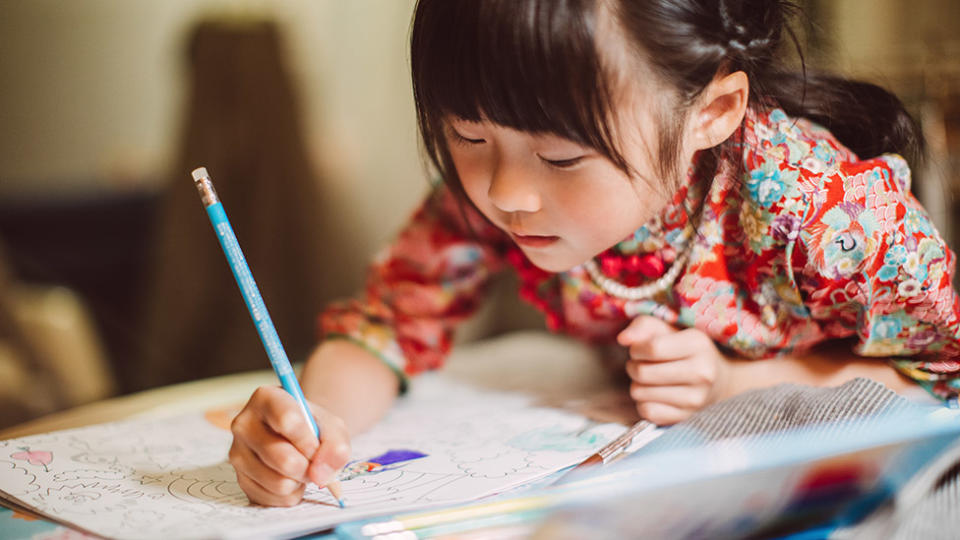How to talk about coronavirus with your kids

As shopping aisles empty, face masks materialise on the street, and cases of coronavirus continue to spread, many are of us are feeling crippled with anxiety and uncertainty about the scary pandemic.
We all know the old saying that worrying never fixed a problem, but battling anxiety it’s not as simple as flicking a switch, and when you add kids to the equation, it can feel highly overwhelming.
Walking them through their stress while battling your own, particularly as they juggle information coming from home, school and their iPhone screens is a challenge, but one that parents can thankfully approach with plenty of advice and resources.
At the initial sign of a global outbreak, the World Health Organisation released a basic guide to children’s corona anxiety for parents. Their primary advice is to listen to kid’s concerns and respond with extra love and attention.
How exactly to listen and respond can seem a little daunting, so we have compiled the easiest ways to approach and move through the virus with your little one.

‘Information and intonation’ key to coronavirus communication
Lorraine Corne is a family and child psychologist of over 27 years and says the key to helping a child through the panic is using the right tone.
“Intonation and reassurance are the two important aspects of this,” she tells Yahoo Lifestyle. “When you’re anxious you don’t feel secure and insecurity comes from too much information and not enough reassurance.”
She says approaching kids with a calm and even tone will give them the security they crave.
“We have to make it light and breezy and then get down to the nitty-gritty as to what they want to know,” she says.
Calm yourself first

Of course, light and breezy is a little hard to muster if you, like many, are already feeling anxious. It is paramount that you feel calm before you try and alleviate anyone else’s stress – like putting on your own life-jacket first.
“Children can feel anxiety coming from a parent,” Dr Corne says. “Even if it’s not in the words they’re saying it’s in the body language and the tone.”
To make sure you are available to your child, Dr Corne recommends choosing the right moment, ie. not broaching the topic in the middle of stressful dinner prep, and taking an appropriate amount of time to relax before approaching your child.
“Parents need to preempt this, as they’re not going to relax very quickly,” she says. “They need to take half an hour before they approach the kids.”
She suggests taking a ten-minute walk, having a chat with a loved one or trying to squeeze some exercise in.
“When you’re calmer your tone also sounds calmer,” she says. “It sounds more loving, it sounds more understanding and it sounds more respectful.”
Find out what they know about COVID-19

Before you start volunteering information, ask a few questions to gauge exactly how much your 7-year-old needs to know about the pandemic.
Dr Corne suggests asking your child a general question, like what they know about the virus so far, or what parts of it they find scary, as many kids might struggle to articulate what really has them nervous.
“Parents don’t sometimes realise that because there is a lot of talk about the impact [of the virus] the elderly, they get very concerned about their parents and grandparents dying but they may not say that,” she says. “So that’s why it’s very important for a parent to ask a question about what they know.”
“This is about [responding] if the child appears anxious about it, and just naturally asking them about it.”
Give them control by delegating tasks

It may seem counter-intuitive, but kids feel less stressed when they feel in control, and giving them extra responsibility can be a great way of soothing their nerves.
Dr Corne suggests meeting as a family and delegating tasks to minimise risk of infection in the household.
“I would be bringing to the table a little family meeting with a list of things we can be prepared for to be safe,” she says.
“Each child can take responsibility for something, and own that as their job.”
Examples include putting up signs to remind guests and family members to wash their hands.
If you have multiple kids, you can divvy up tasks – for example, one might choose a song for the family to sing to time their handwashing correctly, while another might be in charge of placing hand sanitiser by the door for guests.
Limit the information
When it comes to coronavirus you want yourself and trusted sources like teachers to be your child’s filter for information.
“I wouldn’t be putting the news on in front of the child,” says Dr Corne.
She says putting information into kid-friendly formats can be a great way to bring it down to their levels - try using arts and craft to describe the virus and explain its impact on a global scale.

In terms of iPhone use, it can be a good idea to try and discourage kids from getting unregulated information from social media. Keeping an eye on what they’re consuming is a great way to help them navigate the situation.
Keep to regular routines and schedules
The World Health Organisation emphasises the importance of a consistent schedule to a kid’s sense of safety.
Whether your child stays in school, or if you need to self-isolate for a couple of weeks, it’s a good idea to follow a daily itinerary.
“Keep to regular routines and schedules as much as possible, or help create new ones in a new environment, including school/learning as well as time for safely playing and relaxing,” their factsheet advises.
For teenagers, listen and respond.
When it comes to teens, Dr Corne says it’s all about closing your mouth and opening your ears.
“When you’re talking separately to teenagers you have to be very respectful and really have to listen to them for some time and then ask them what they would like to know from you,” she says.
“Don’t run in with solutions, that’s the difference with teenagers.”
Lorraine Corne is the author of ‘The Little Book of Anxiety Fixes’, a guide for adults and teens to combat anxiety in smart steps that take less than 15 minutes, available on Amazon.
Got a story tip or just want to get in touch? Email us at lifestyle.tips@verizonmedia.com.

 Yahoo Lifestyle
Yahoo Lifestyle 




